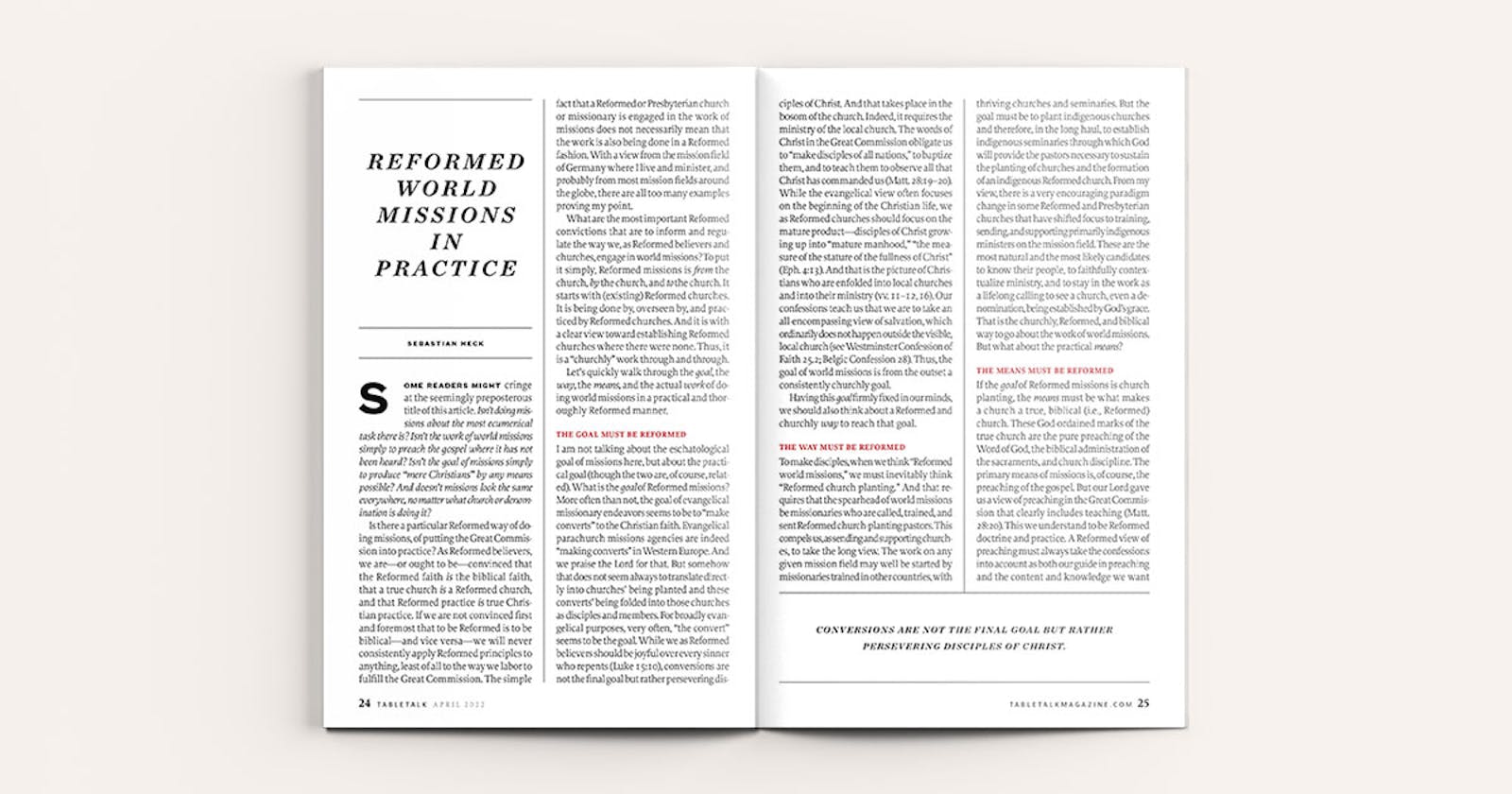
Request your free, three-month trial to Tabletalk magazine. You’ll receive the print issue monthly and gain immediate digital access to decades of archives. This trial is risk-free. No credit card required.
Try Tabletalk NowAlready receive Tabletalk magazine every month?
Verify your email address to gain unlimited access.
Some readers might cringe at the seemingly preposterous title of this article. Isn’t doing missions about the most ecumenical task there is? Isn’t the work of world missions simply to preach the gospel where it has not been heard? Isn’t the goal of missions simply to produce “mere Christians” by any means possible? And doesn’t missions look the same everywhere, no matter what church or denomination is doing it?
Is there a particular Reformed way of doing missions, of putting the Great Commission into practice? As Reformed believers, we are—or ought to be—convinced that the Reformed faith is the biblical faith, that a true church is a Reformed church, and that Reformed practice is true Christian practice. If we are not convinced first and foremost that to be Reformed is to be biblical—and vice versa—we will never consistently apply Reformed principles to anything, least of all to the way we labor to fulfill the Great Commission. The simple fact that a Reformed or Presbyterian church or missionary is engaged in the work of missions does not necessarily mean that the work is also being done in a Reformed fashion. With a view from the mission field of Germany where I live and minister, and probably from most mission fields around the globe, there are all too many examples proving my point.
What are the most important Reformed convictions that are to inform and regulate the way we, as Reformed believers and churches, engage in world missions? To put it simply, Reformed missions is from the church, by the church, and to the church. It starts with (existing) Reformed churches. It is being done by, overseen by, and practiced by Reformed churches. And it is with a clear view toward establishing Reformed churches where there were none. Thus, it is a “churchly” work through and through.
Let’s quickly walk through the goal, the way, the means, and the actual work of doing world missions in a practical and thoroughly Reformed manner.
the goal must be reformed
I am not talking about the eschatological goal of missions here, but about the practical goal (though the two are, of course, related). What is the goal of Reformed missions? More often than not, the goal of evangelical missionary endeavors seems to be to “make converts” to the Christian faith. Evangelical parachurch missions agencies are indeed “making converts” in Western Europe. And we praise the Lord for that. But somehow that does not seem always to translate directly into churches’ being planted and these converts’ being folded into those churches as disciples and members. For broadly evangelical purposes, very often, “the convert” seems to be the goal. While we as Reformed believers should be joyful over every sinner who repents (Luke 15:10), conversions are not the final goal but rather persevering disciples of Christ. And that takes place in the bosom of the church. Indeed, it requires the ministry of the local church. The words of Christ in the Great Commission obligate us to “make disciples of all nations,” to baptize them, and to teach them to observe all that Christ has commanded us (Matt. 28:19–20). While the evangelical view often focuses on the beginning of the Christian life, we as Reformed churches should focus on the mature product—disciples of Christ growing up into “mature manhood,” “the measure of the stature of the fullness of Christ” (Eph. 4:13). And that is the picture of Christians who are enfolded into local churches and into their ministry (vv. 11–12, 16). Our confessions teach us that we are to take an all-encompassing view of salvation, which ordinarily does not happen outside the visible, local church (see Westminster Confession of Faith 25.2; Belgic Confession 28). Thus, the goal of world missions is from the outset a consistently churchly goal.
Having this goal firmly fixed in our minds, we should also think about a Reformed and churchly way to reach that goal.
the way must be reformed
To make disciples, when we think “Reformed world missions,” we must inevitably think “Reformed church planting.” And that requires that the spearhead of world missions be missionaries who are called, trained, and sent Reformed church-planting pastors. This compels us, as sending and supporting churches, to take the long view. The work on any given mission field may well be started by missionaries trained in other countries, with thriving churches and seminaries. But the goal must be to plant indigenous churches and therefore, in the long haul, to establish indigenous seminaries through which God will provide the pastors necessary to sustain the planting of churches and the formation of an indigenous Reformed church. From my view, there is a very encouraging paradigm change in some Reformed and Presbyterian churches that have shifted focus to training, sending, and supporting primarily indigenous ministers on the mission field. These are the most natural and the most likely candidates to know their people, to faithfully contextualize ministry, and to stay in the work as a lifelong calling to see a church, even a denomination, being established by God’s grace. That is the churchly, Reformed, and biblical way to go about the work of world missions. But what about the practical means?

the means must be reformed
If the goal of Reformed missions is church planting, the means must be what makes a church a true, biblical (i.e., Reformed) church. These God-ordained marks of the true church are the pure preaching of the Word of God, the biblical administration of the sacraments, and church discipline. The primary means of missions is, of course, the preaching of the gospel. But our Lord gave us a view of preaching in the Great Commission that clearly includes teaching (Matt. 28:20). This we understand to be Reformed doctrine and practice. A Reformed view of preaching must always take the confessions into account as both our guide in preaching and the content and knowledge we want to inculcate in recent converts as well as in seasoned believers. In our confessions and catechisms, Reformed churches have a standard not only of what is to be taught but also of what is to be believed by disciples of Christ. This takes place by means of catechesis—i.e., instruction in and with the catechisms and confessions of the church. Preaching as the primary means of grace always includes an emphasis on catechesis, even more so on the mission field, where we are often dealing with young and (initially) immature believers. Along with our Reformed covenant theology, which compels us to catechize our covenant children, catechesis before converts make a profession of faith and lifelong catechesis as part of the teaching ministry of the church is imperative to Reformed world missions. Catechesis is also the school of preparation for future officers of the church.
But clearly there can be no disciples anywhere in the world without implementation of the other two marks of the church. And our Lord does mention the role of the sacraments (“baptizing them in the name of the Father and of the Son and of the Holy Spirit,” Matt. 28:19) and the role of church discipline (“teaching them to observe all that I have commanded you,” v. 20). These three marks both identify any Reformed church and also provide our marching orders for missions. Indeed, they are the mission of the church.
the work must be reformed
Finally, faithful Reformed world missions must recover and practice the biblical teaching of the unity and catholicity of the church. On a very practical level, this means that world missions is the calling of the entire church, not something delegated to the missionary. Being united in a common confession of faith, Reformed churches must reappropriate their calling to make disciples of all nations. Reformed missions is not just the goal of reaching all nations; it is also the united work of the church in all nations. Therefore, seeing indigenous churches and denominations being established on the mission fields around the world should never simply be something we help others do. It is the work of missions that we all do together. It is the work to which we have all been called.
Let me end with a brotherly appeal. Let us be truly Reformed churches indeed, churches who identify, send, and support indigenous missionary pastors. Pray daily and earnestly for them that they will be our faithful missionaries on the ground. Support these men as faithfully and as generously as you would support your pastors at home. Stick with them for the long haul, as long as it takes for an indigenous church to be established. If we do that, not only are we actually being faithful to carry out our missionary mandate in a truly Reformed manner, but we might also experience a renewed sense of being involved firsthand in the actual Reformed work of world missions—to the glory of God.
